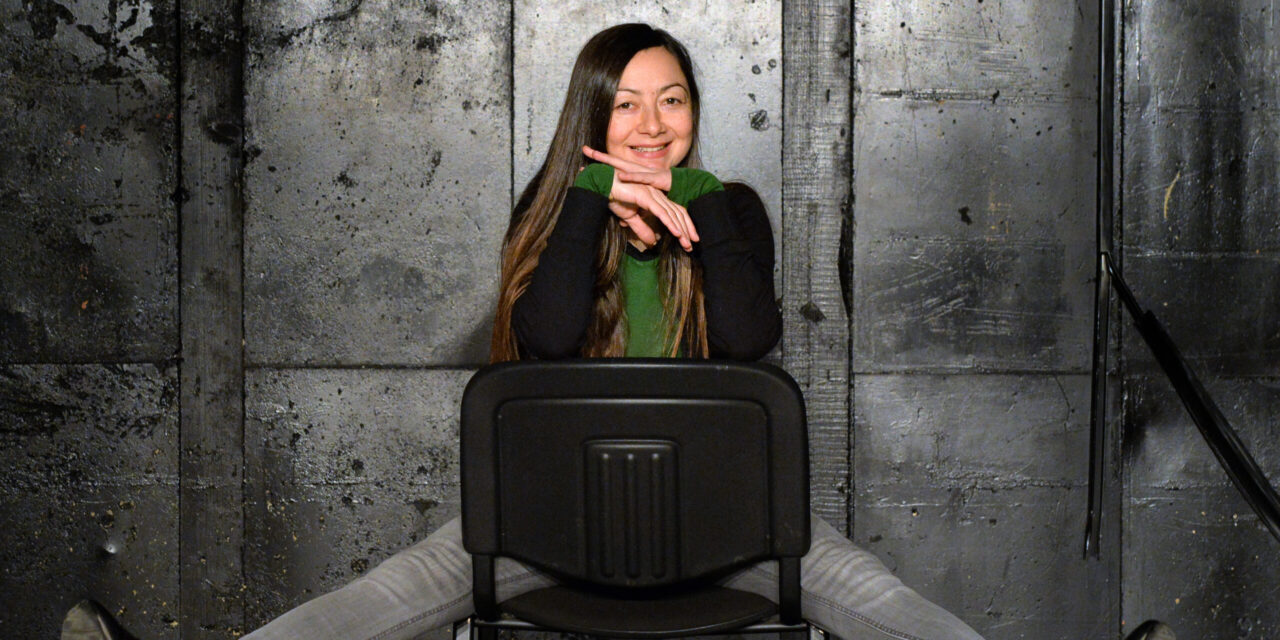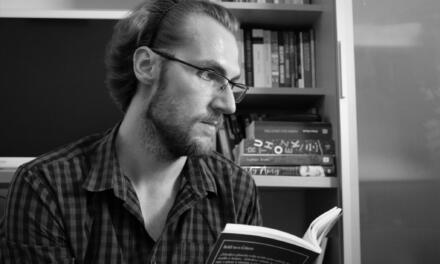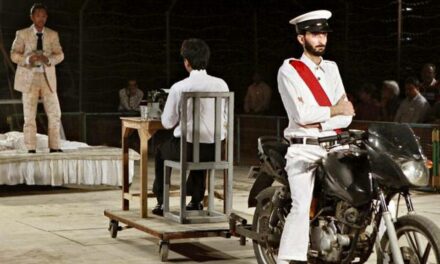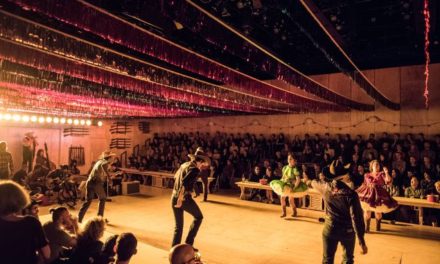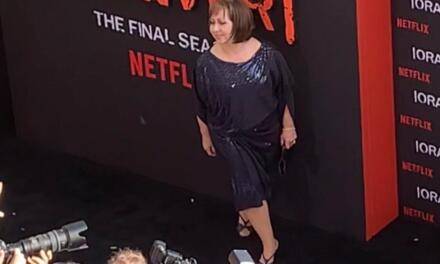Five years ago in November, a new space for contemporary dance and performance opened its doors in downtown Sofia. It breathed fresh air into the vivid Bulgarian independent performance scene that is constantly struggling to find stability. There were several stages and spaces warmly welcoming independent projects then. An emblematic example is The Red House Centre for Culture and Debate Andrey Nikolov, which had to close at the beginning of 2020. However, all of them were independently run and managed by NGOs and small, private companies, who could host events but rarely were able to produce in full-scale. What is more, that same year a new methodology of calculating the ticket dotation for the state-run performing arts institutions was adopted by the Ministry of Culture, making it unprofitable for theaters to invite freelancers to work on their stages.
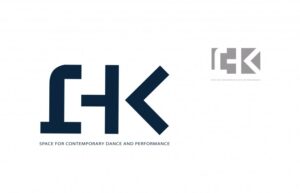
In that context, DNK – Space for Contemporary Dance and Performance (DNK) appeared on the ground floor of the National Palace of Culture, a massive, polygonal edifice situated in the heart of the city surrounded by a spacious park with fountains. The whole complex was designed and constructed in the 1980s during State Socialism as part of a vast plan for celebrating Bulgaria’s 1300th anniversary. Today, the eight floors of the building are used as a multifunctional conference and exhibition center for a variety of events, ranging from high-profile political meetings to annual fairs to concerts, exhibitions, and performances by Bulgarian and international artists.
Among them, DNK stands out with a clear profile and exciting content. The name “DNK” is the Bulgarian abbreviation of DNA. It also interplays with the title of the National Palace of Culture, commonly called NDK. Combining the two, space elegantly states, just with its existence, that contemporary art is in the DNA of culture and wastes no time proving it with actions. In its five years of existence, DNK gained the trust of the most established Bulgarian contemporary artists such as Iva Svesharova, Willy Prager, Mladen Alexiev, Ani Vaseva, Anna Dankova, the artistic collective Steam Room, Gergana Dimitrova, and 36 Monkeys, Galina Borissova and many others by and producing or co-producing their work. It also attracted some renowned Bulgarian artists living abroad, like Maria Kefirova and Christian Bakalov, who gave workshops or created pieces in the space. Simultaneously, DNK launched the “Migrating Body” international program that has run for several years and welcomed international artists, much-presented work in the country for the first time, like Jerome Bel and Marco Berrettini. Last but not least, space managed to reach beyond its own black walls with the project “Excused Presences,” which aimed to introduce middle and high school students to contemporary art by sending artists to their classes.
On the occasion of the anniversary, I met with the Artistic Director of DNK, the performing arts researcher and critic Mira Todorova, Ph.D. Our conversation took place in the midst of the second wave of the pandemic, with performing venues in Bulgaria being allowed to use 30% of their auditorium capacity.
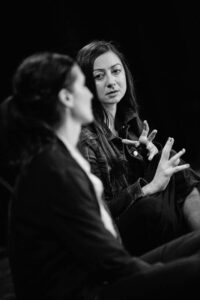
Photo: Orlin Ognyanov
Ina Doublekova: How much time is five years in the life span of an institution and a space for contemporary art like DNK?
Mira Todorova: It’s not a very long time, but still it’s long enough to be able to create a profile, to set some aesthetic paradigms, to launch various streams of development, and to initiate different programs. It’s also long enough to start stabilizing it on the map of the European and global cultural networks and spaces, to exchange ideas, practices, artists, and performances, and maybe to start building regular audiences and even try to expand them. But it is not long enough at all to prove stability and sustainability, to convert people to emancipated spectatorship that contemporary forms of performing arts demand, or to make them feel comfortable and at ease with things they do not necessarily understand, but could feel, sense, or connect to in a different way that is less based on rationality, which the traditional forms of performing art have taught them.
ID: What does an average DNK season look like in numbers?
MT: Each season we have an average of five to six new premiers of Bulgarian performances that we co-produce. Every year, there is a minimum of 10 foreign performances that we host as part of our international platform “Migrating Body” that takes place every month. Each one of these consists of a workshop for local professionals, and a presentation/discussion/post-show talk with the audience. Altogether we have around 120 events annually.
ID: What is DNK and how would you define its mission?
MT: DNK was founded in 2015 as a multidisciplinary space focused on contemporary dance and performance. The idea was to accommodate diverse forms of contemporary performing and visual arts in the program. One of the main goals is to identify and strengthen artistic potential by providing artistic projects with development and presentation opportunities. We also aim to expand it by providing education and training programs, workshops, lectures, screenings, and discussions. DNK seeks to explore the notions of freedom, movement, experiment, openness, and sharing in the arts through different media and concepts. It supports the development of contemporary performing art forms locally and internationally by investing in the creative capacity of the active players in the field. DNK is a platform for converging artistic contexts, thus fostering the constant exchange of ideas, visions, and perspectives. It is also space where artists meet their audiences.
ID: Did this vision alter over time, and in what way?
MT: I would say the vision is still the same, but we constantly come up with new ideas and projects through which we could better realize our intentions and the purpose DNK was initially created to serve. We started a residency program where we invite international companies/artists to work on their new projects in our space for longer periods, thus being able to be in more intense contact with their Bulgarian colleagues. This also allows them to exchange ideas, knowledge, and share visions of the world, contemporaneity, and art. For the Bulgarian ethos and environment, which is rather closed and traditionally oriented, it is very important that contemporary art circles and audiences are presented with influences from abroad because contemporary art cannot be a national, local, secluded phenomenon. It can only thrive in the broad landscape of international cross-fertilization.
ID: If you are allowed to dream big and be given endless resources at your disposal, what would DNK be in five years from now?
MT: Well, in five years we will be 10! That is still a very short time, but hopefully, we will be one of the most recognizable brands/places of contemporary performing arts where one can totally trust the quality of the programming. Even if you just turn up on the spot, you could always see something really good – local or international. It would be lovely if we have enough resources to produce new projects, to commission artistic works, to organize our own festival and international conferences, and to be part of the best international professional networks and organizations. I would be very happy if we could develop a kids/children program with performances and workshops for young audiences because I believe that arts education is very important. We have already started a program for school kids aged 15-18; it is called “Excused Presences” (as an opposite to the “unexcused absences” when children skip classes they find boring). It comprises of meetings/talks with artists, lectures, presentations, workshops, seeing performances, and discussions afterward.
ID: Coming back to the present and its circumstances, what would you distinguish as your greatest achievements so far?
MT: Maybe the greatest achievement is that I was crazy enough to believe that we could convert a former disco into a contemporary art space and start from scratch! It took many sleepless nights and emotionally intense, hectic days. For me, the greatest achievement was that we managed to establish a yearlong international program, featuring globally-renowned artists in the sphere of contemporary dance and performance, with funding from local and international institutions, various donors, and cultural institutes. The arrangement with the National Palace of Culture, to whose administrative structure DNK belongs, has always been that we have space, basic technical equipment, and team, but we have to fundraise for programming. So we have the hardware, but we have to provide the software. It was an achievement to build a program with various strands of activities and minimum aesthetic compromise.
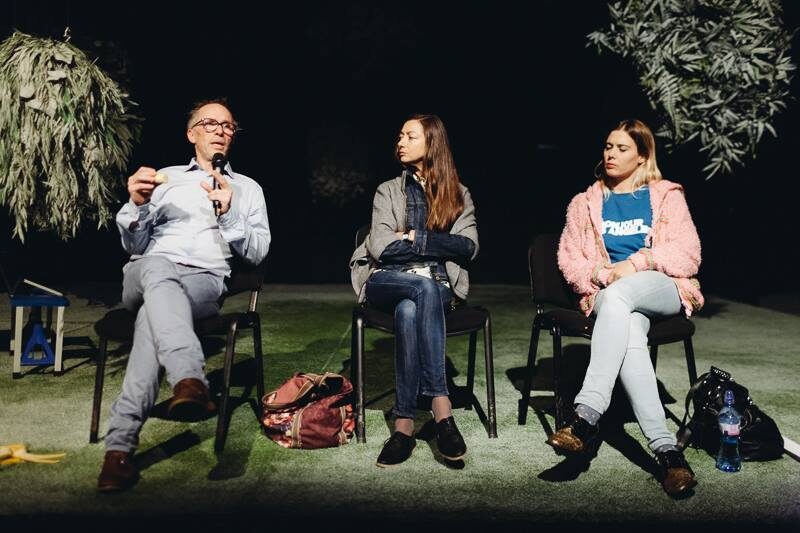
Mira Todorova (in the middle) during a post-show talk with Marco Berrettini (left) and Marie-Caroline Hominal (right), following the performance iFeel2 at DNK.
ID: How do you solve the contemporary art management dilemma of “quality vs. quantity,” and what tricks do you use to keep DNK existing in the global market economy?
MT: I was always on the side of the quality! In my work, it has been one of the main guidelines – the conviction that I should never compromise the quality of the program in order to have cheaper but more, for example, international projects. It has always been a matter of sharing artists, performances, practices and ideas I find fascinating and inspiring with Bulgarian audiences. I wanted to bring the things I have had the chance to experience abroad and have found thrilling to Sofia. This can expand the horizons of our understandings, our views, and our perceptions not only intellectually, but emotionally as well. The mission of our space is to be a space of possibility, a space to get in touch with things that cannot be seen or experienced in Sofia, in Bulgaria. Of course, we could not invite the most glamorous shows or the biggest names and their spectacular performances, but that is not the point, because all these things do not challenge the status quo. They just make it more beautiful and bearable, which is great! But I was hoping to bring some ideas of change, to provide dissensus as Jacques Rancière would define it.
ID: As artistic director of DNK and a researcher, could you briefly sketch the most important tendencies and processes you witnessed evolving on the contemporary performing arts scene in Bulgaria over the last five years?
MT: Maybe the most important and visible trend is that the scene, which I would position as the independent scene because most of the contemporary performing art is produced by independent artists and companies working on a project basis, has united to formulate clear messages of the need for change. They have addressed the authorities – municipal and state – on politics and the arts, the funding system, the structure of the performing arts ecosystem, and so forth. The scene has gotten stronger, its profile has become clearer, and it has proved to be the creator of a vibrant arts environment that suits contemporary trends and directions of development in a global context. The scene now has emancipated itself immensely and has gained a seat at the table where decision-making takes place. The scene has a crucial international dimension that represents the state of being in contemporary society. I think it will enhance the political aspect of creative work, not just in terms of content or themes tackled, but more broadly – as an open expression of artists’ belonging to the civil space, not just to the realm of aesthetics.
ID: Why should contemporary art be in the DNA of culture?
MT: In “What is the Contemporary?” Giorgio Agamben writes: “truly contemporary, truly belong to their time, are those who neither perfectly coincide with it nor adjust themselves to its demands.” He insists “contemporariness is, then, a singular relationship with one’s time, which adheres to it and, at the same time, keeps a distance from it.” So one must be plugged into the electricity of the present and be aware of the issues around the world, but at the same time not be totally immersed in it, because that would result in blindness and deprive them of critical reflection. So for me, contemporary art is about being up-to-date on the world but be distant enough in order to use art to be critical of it. If I can use Jean Luc Nancy’s notion on the contemporary piece of art – it is something that creates a world of its own, which is not an easy one. It is a fragile, vulnerable, restless world, that does not just reaffirm the bigger one. That is where the importance and agency of contemporary art lies. Bulgaria does not have a strong tradition in valuing critical reflexivity. Neither is there a tradition in empowering people to be pro-active citizens with a sense of solidarity and political agency (in the broadest sense of political), like living together and taking part in actions that may rearrange societal relations as Rancière understands it. That is why I think initiatives like DNK have a crucial role.
ID: How the pandemic affected you so far?
MT: I lost the team of people I worked with. We have a very limited program and the capacity of seating is down to 30% of the auditorium. This is really a small number because it is already a small place; 120 seats is the maximum capacity. Now we are allowed to work but practically, this does not make sense for the institution, or for the artists. So we are waiting to see how the situation unfolds. I have postponed plans for the unforeseeable future. Unfortunately, now we are on the verge of failure for many reasons, with Covid-19 being only one of them.
ID: What is the role of spaces like DNK in the present emergency situation, аnd in the wider cultural context after we overcome it?
MT: In Sofia, and in Bulgaria in general, there are not many places (literally only two or three) that work with and for the independent scene. Also, there are not many places where people can see international productions throughout the year. There are festivals, but no theatre space that constantly presents international work. This has convinced me that it is very important to keep DNK. And, of course, without infrastructure, no sustainable development of the contemporary performing arts scene can be pursued.
This interview was taken as part of “Zoom In / Приближаване“ individual project of the author, supported by the National Culture Fund of Bulgaria.
This post was written by the author in their personal capacity.The opinions expressed in this article are the author’s own and do not reflect the view of The Theatre Times, their staff or collaborators.
This post was written by Ina Doublekova.
The views expressed here belong to the author and do not necessarily reflect our views and opinions.

